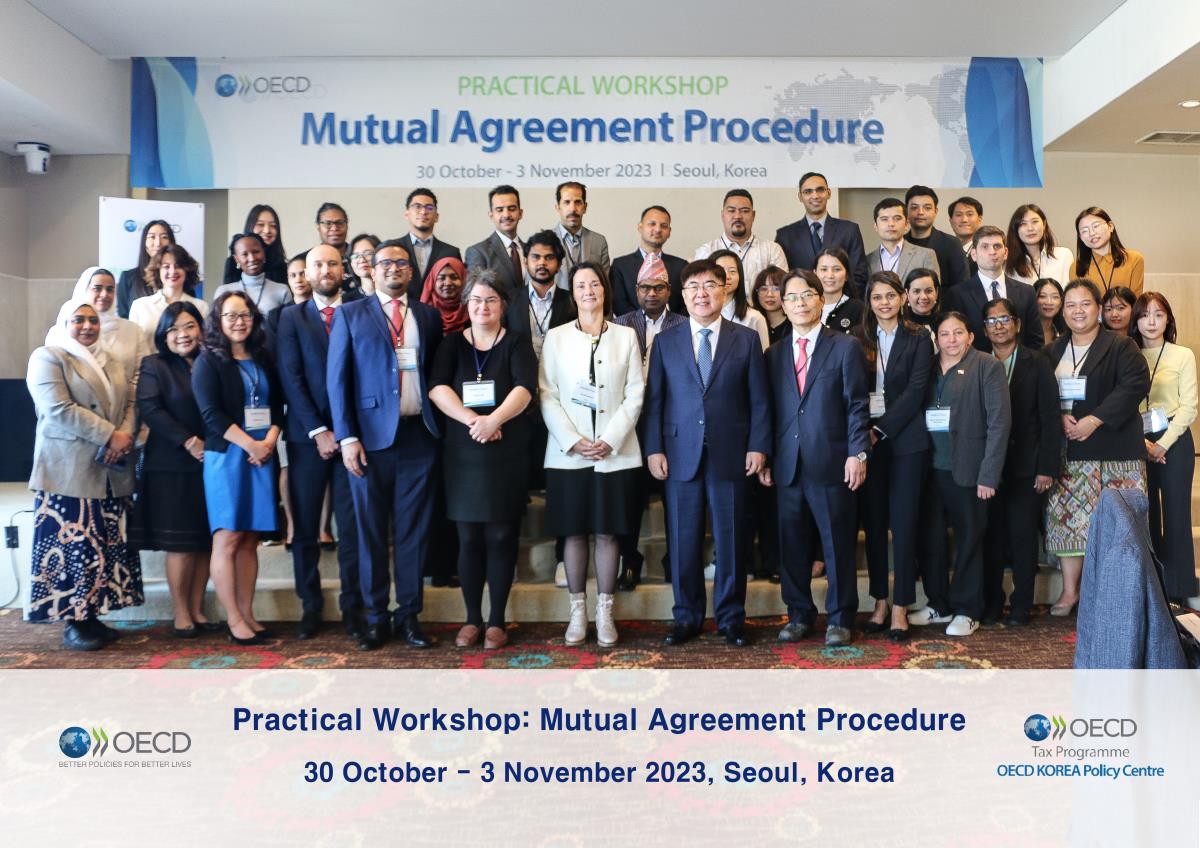Welcoming Message History and Mission Programmes Location Organization Notice
Events - Seminar - Workshop - Forum - Expert Meeting - Capacity-Building
Research Publications Competition Policy Trends Family Database in the Asia-Pacfic Region Links
Workshop 2023-10-30~2023-11-03

The OECD Korea Policy Centre's Tax Programme, in collaboration with the OECD, hosted an International Tax Workshop on the Mutual Agreement Procedure (MAP) at the President Hotel in Seoul, Korea from 30 October to 3 November. The workshop was attended by 35 tax officials from 19 non-OECD countries in the Asia-Pacific region. Sandra Knaepen (OECD), Sriram Govind (OECD), Allit Lohbeck (Germany), Maggie Carver (USA), and Ciaran Macken (UK) led the sessions throughout the workshop.
On October 30, the first day of the workshop, an ice-breaking session was held for the participants to learn Korean phrases. Then, there was an introduction to the MAP and a lecture on BEPS 14. The speakers explained that the Mutual Agreement Procedure(MAP), stated in Article 25 of the OECD Model Tax Convention, is aimed at resolving the disputes arising in the application and interpretation of a tax treaty. On the topic of BEPS 14, the speakers explained the background and the minimum standards for Mutual Agreement Procedure(MAP) and best practices. They explained that the number of disputes had increased, which required to make guidelines for solving them. BEPS Action 14 suggested prompt implementations of the mutual agreement procedures in good faith, expedited administrative procedures, and taxpayer's easy access to the procedure as key elements.
Then the speakers proceeded to the key issues in the tax treaty context related to Article 25 of the OECD Model Tax Convention minimum standards for mutual agreement procedures, as well as other related issues. They also highlighted the key steps in the mutual agreement process and best practices for dispute prevention.
On the second day, the speakers focused on the Mutual Agreement (MAP) statistics and Advance Pricing Arrangements (APAs) and also the case studies. The speaker explained the background and current issues on the topic and suggested recommendations. However, it was pointed out that the challenges in MAP statistics included the need for jurisdictions to include cases in their mutual agreement statistics (MAP), the need to include cases of delegation and denial, and the need to finalize timeframes and dates. Regular communication with treaty partners was suggested as a solution. Various systems were introduced as a way to prevent disputes, including the arm's length method pre-approval system, which allows taxpayers to agree in advance with the tax authorities on the method and scope of the arm's length method to be applied in transactions with foreign related parties. After reviewing the features, legal basis, and scope of the system, the participants engaged in a case study and discussion.
On 1 November, the third day of the event, a cultural day was held, during which all participants visited various tourist attractions in Seoul, including Gyeongbokgung Palace, N Seoul Tower and Bukchon Hanok Village.
On 2 and 3 November, the speakers covered the process and procedures of the MAP. They explained that the MAP process can be divided into a unilateral phase and bilateral phase. The unilateral phase begins with a request for MAP from the taxpayer, and the competent authorities examine the appropriateness and conduct case analysis. After the unilateral phase, the competent authorities prepare a position paper, proceed discussions and reach an agreement. Afterwards, the participants were engaged in a case study and discussion. For the case study, the participants were provided material with a fictitious company with operations in two countries and a tax treaty between the two countries.
During the five-day event, the participants were able to deepen their understanding of the topic and enhance their practical skills through case studies and discussions, as well as lectures introducing the latest trends.